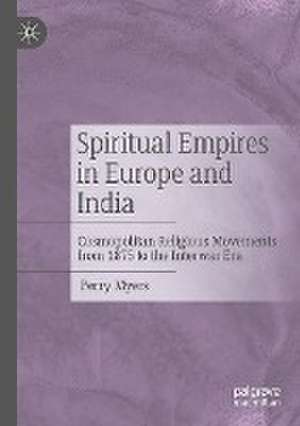Spiritual Empires in Europe and India: Cosmopolitan Religious Movements from 1875 to the Interwar Era
Autor Perry Myersen Limba Engleză Paperback – 31 oct 2022
This book provides a comparative analysis of cosmopolitan (esoteric) religious movements, such as Theosophy, Groupe Independent des Études Ésotériques, Anthroposophy, and Monism, in England, France, Germany, and India during the late nineteenth-century to the interwar years. Despite their diversity, these factions manifested a set of common features—anti-materialism, embrace of Darwinian evolution, and a belief in universal spirituality—that coalesced in a transnational field of analogous cosmopolitan spiritual affinities. Yet, in each of their geopolitical locations these groups developed vastly different interpretations and applications of their common spiritual tenets. This book explores how such religious innovation intersected with the social (labor and economic renewal), cultural (education and religious innovation) and political (Empire and anti-colonial) dynamics in these vastly different national domains. Ultimately, it illustrates how an innovative religious discourse converged with the secular world and became applied to envision a new social order—to spiritually re-engineer the world.
| Toate formatele și edițiile | Preț | Express |
|---|---|---|
| Paperback (1) | 627.75 lei 6-8 săpt. | |
| Springer International Publishing – 31 oct 2022 | 627.75 lei 6-8 săpt. | |
| Hardback (1) | 634.50 lei 6-8 săpt. | |
| Springer International Publishing – 31 oct 2021 | 634.50 lei 6-8 săpt. |
Preț: 627.75 lei
Preț vechi: 738.54 lei
-15% Nou
Puncte Express: 942
Preț estimativ în valută:
120.15€ • 124.89$ • 99.53£
120.15€ • 124.89$ • 99.53£
Carte tipărită la comandă
Livrare economică 05-19 februarie 25
Preluare comenzi: 021 569.72.76
Specificații
ISBN-13: 9783030810054
ISBN-10: 3030810054
Pagini: 333
Ilustrații: XIX, 333 p. 9 illus.
Dimensiuni: 148 x 210 mm
Greutate: 0.43 kg
Ediția:1st ed. 2021
Editura: Springer International Publishing
Colecția Palgrave Macmillan
Locul publicării:Cham, Switzerland
ISBN-10: 3030810054
Pagini: 333
Ilustrații: XIX, 333 p. 9 illus.
Dimensiuni: 148 x 210 mm
Greutate: 0.43 kg
Ediția:1st ed. 2021
Editura: Springer International Publishing
Colecția Palgrave Macmillan
Locul publicării:Cham, Switzerland
Cuprins
Chapter 1: Introduction.- Chapter 2: Cosmopolitan Spirituality: Rectifying Materialism.- Chapter 3: The Progress Of Evolution And Spiritual Science.- Chapter 4: Re-Articulating History And Universal Visions.- Chapter 5: Spiritual Elites: Setting The Stage Of Social And Political Conviction.- Chapter 6: Merit-Based Karma And Social Engineering In Germany And France .- Chapter 7: England’s And India’s Spiritual Empire: Merit-Based Karma And Social Engineering.- Chapter 8: Cosmopolitan Spirituality: National Merit In Germany And France.- Chapter 9: A New And Improved Empire: British Spiritual Imperialism And Indian National Renewal.- Chapter 10: Epilogue.
Notă biografică
Perry Myers is Professor of German Studies at Albion College in Michigan, USA.
Textul de pe ultima copertă
This book provides a comparative analysis of cosmopolitan (esoteric) religious movements, such as Theosophy, Groupe Independent des Études Ésotériques, Anthroposophy, and Monism, in England, France, Germany, and India during the late nineteenth-century to the interwar years. Despite their diversity, these factions manifested a set of common features—anti-materialism, embrace of Darwinian evolution, and a belief in universal spirituality—that coalesced in a transnational field of analogous cosmopolitan spiritual affinities. Yet, in each of their geopolitical locations these groups developed vastly different interpretations and applications of their common spiritual tenets. This book explores how such religious innovation intersected with the social (labor and economic renewal), cultural (education and religious innovation) and political (Empire and anti-colonial) dynamics in these vastly different national domains. Ultimately, it illustrates how an innovative religious discourse converged with the secular world and became applied to envision a new social order—to spiritually re-engineer the world.
Perry Myers is Professor of German Studies at Albion College in Michigan, USA.
Caracteristici
Shows how cosmopolitan religious innovation formed common spiritual affinities in Europe and India Reveals how heterodox religious movements intersected with the scientific, social and political domains Shows the relationship between spiritual tenets and the domestic domain
